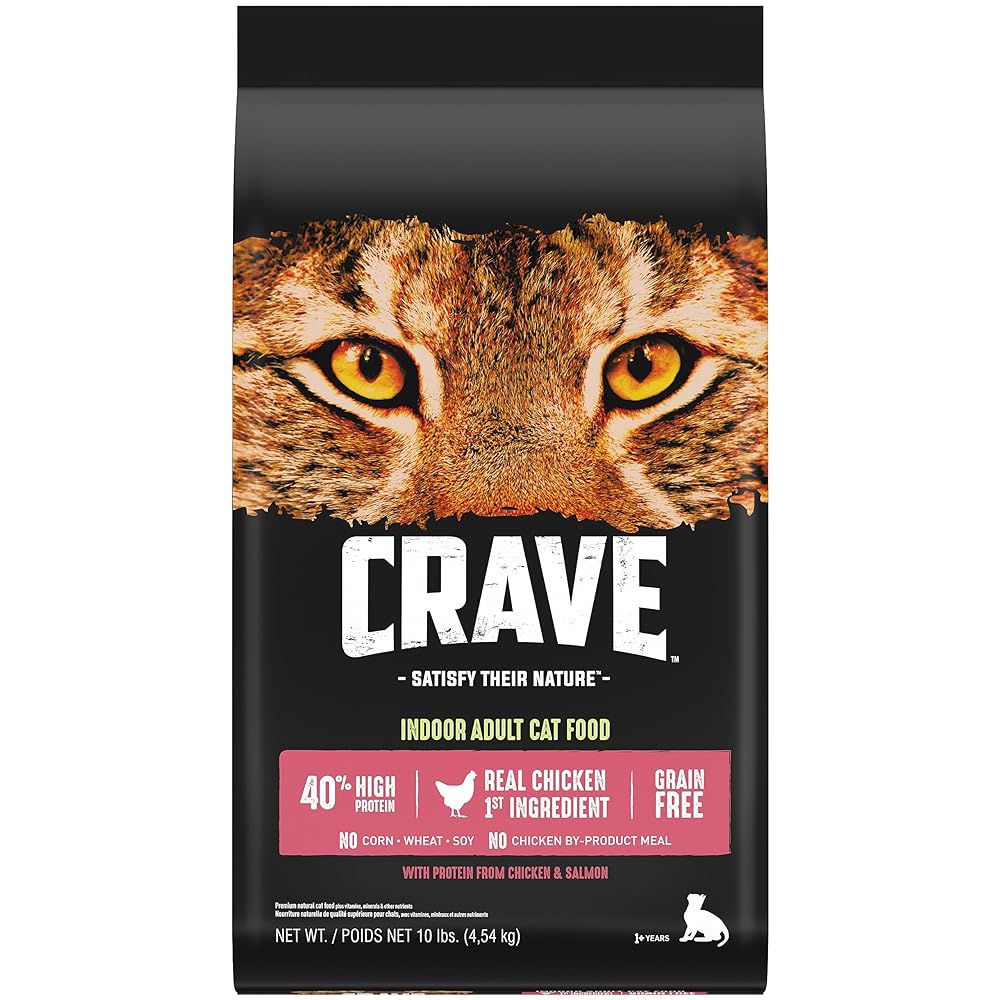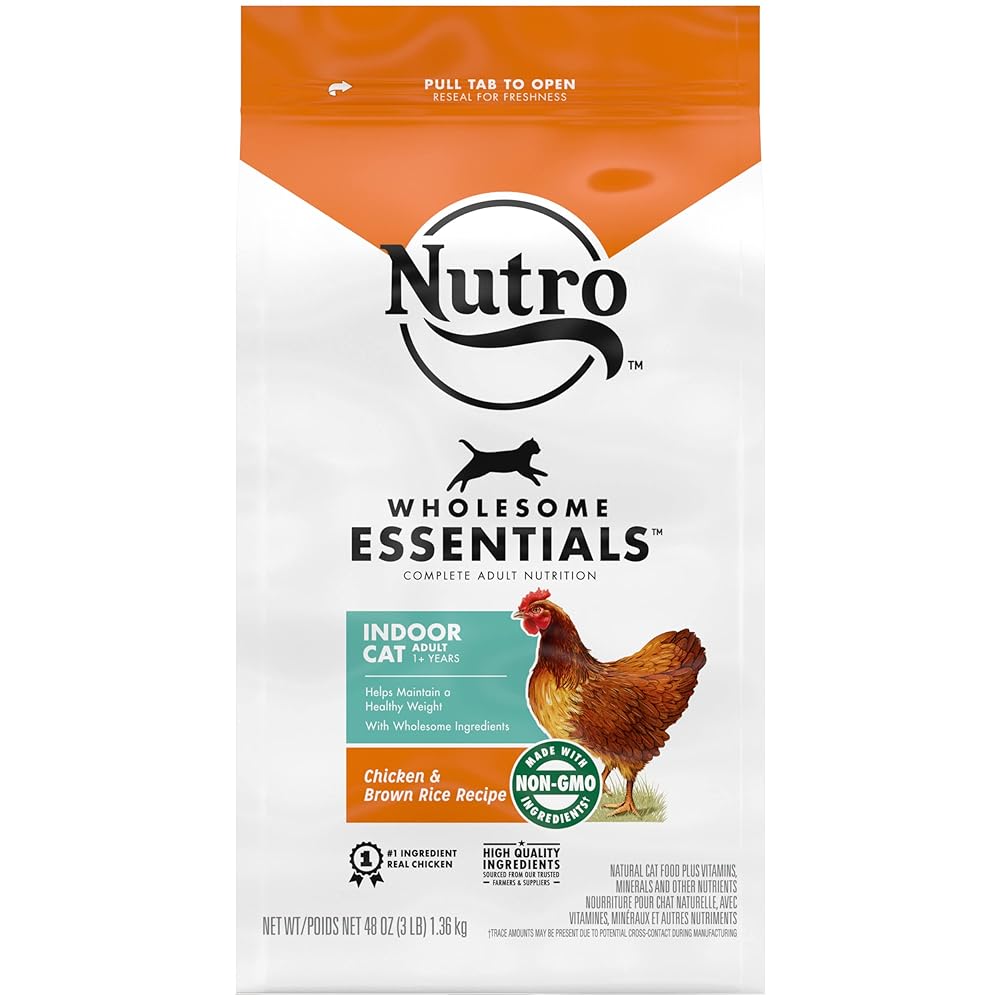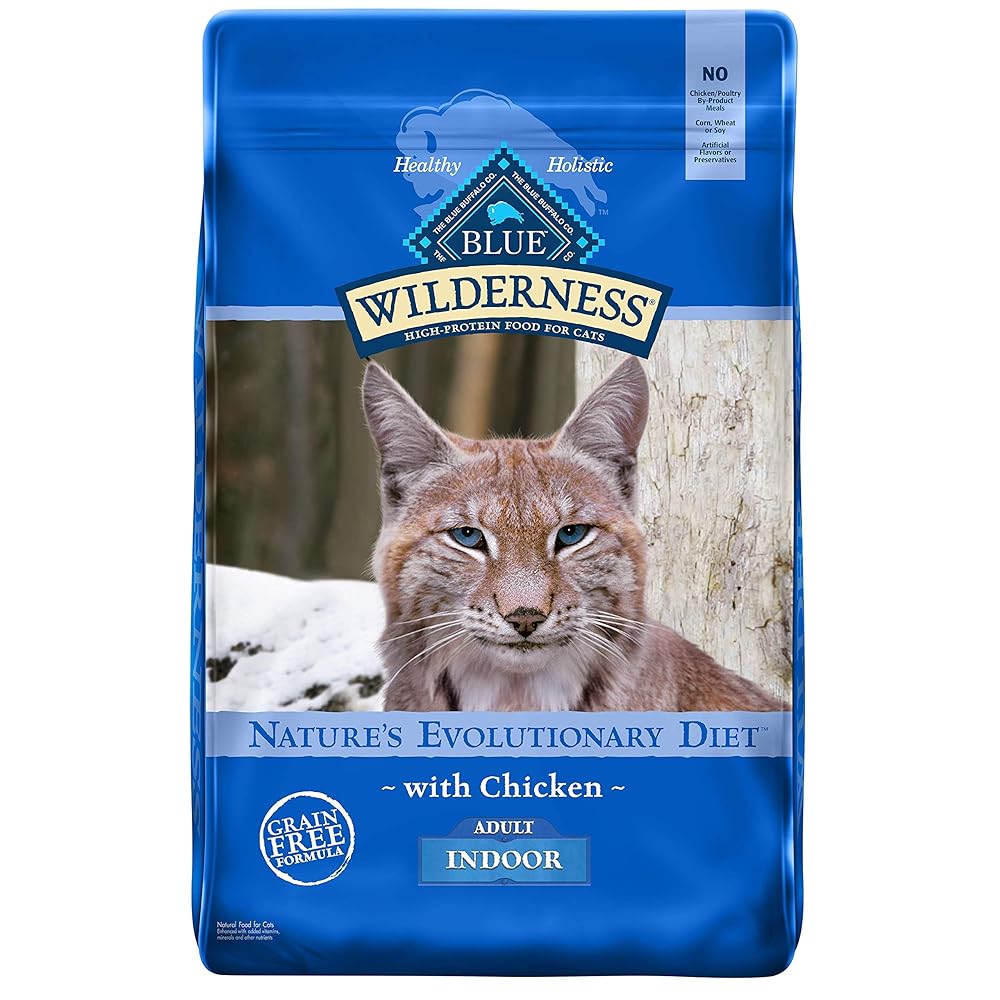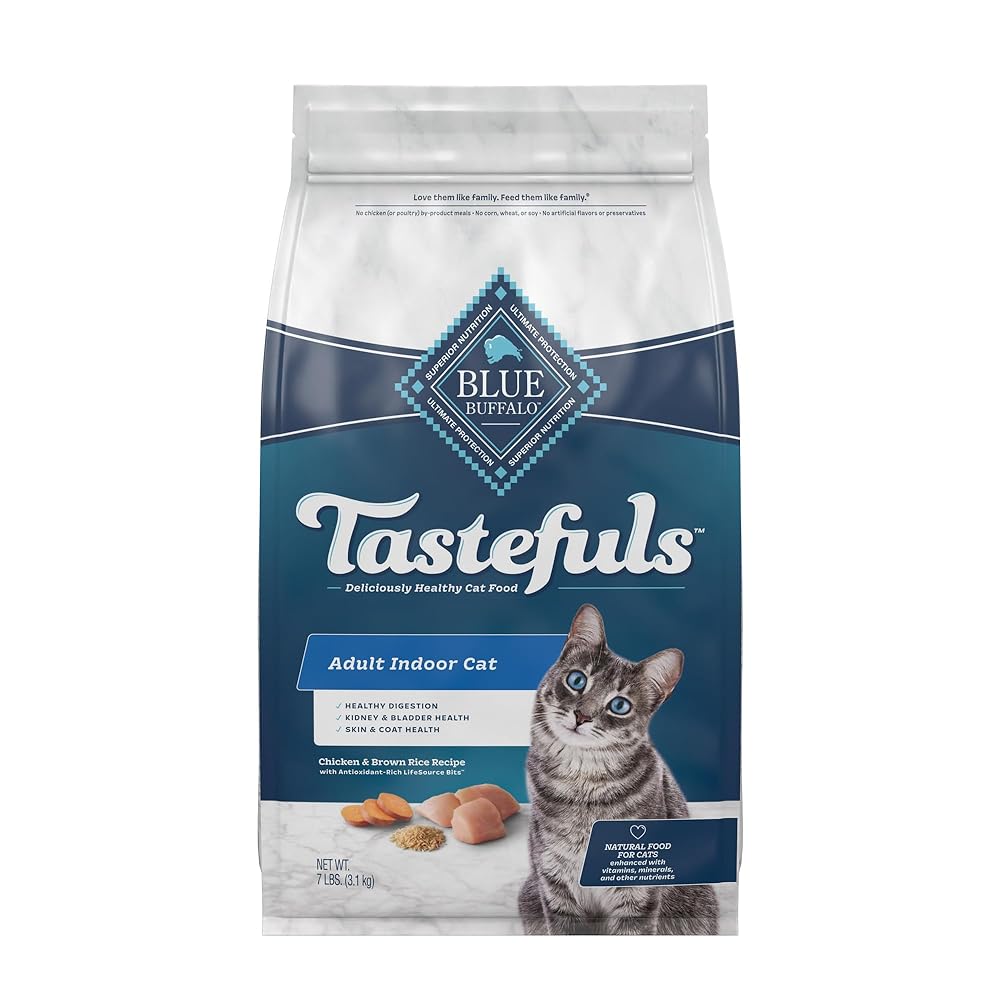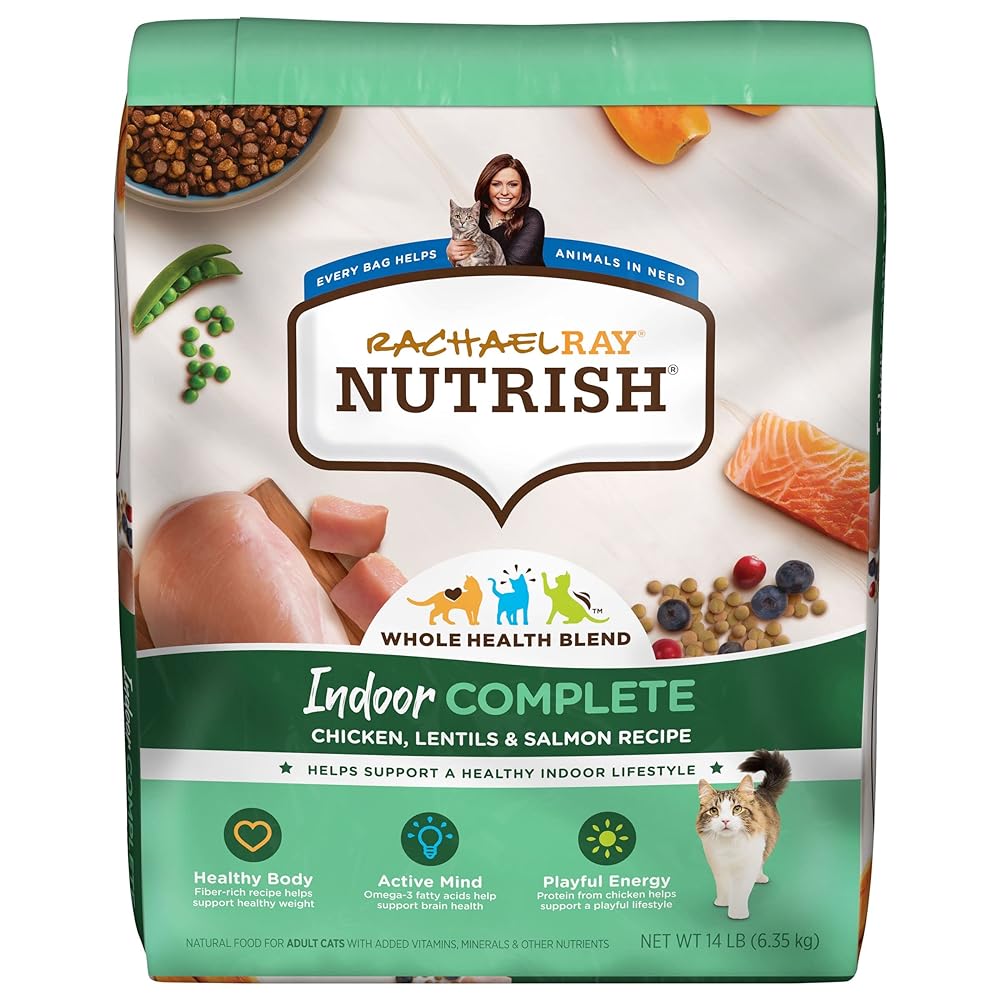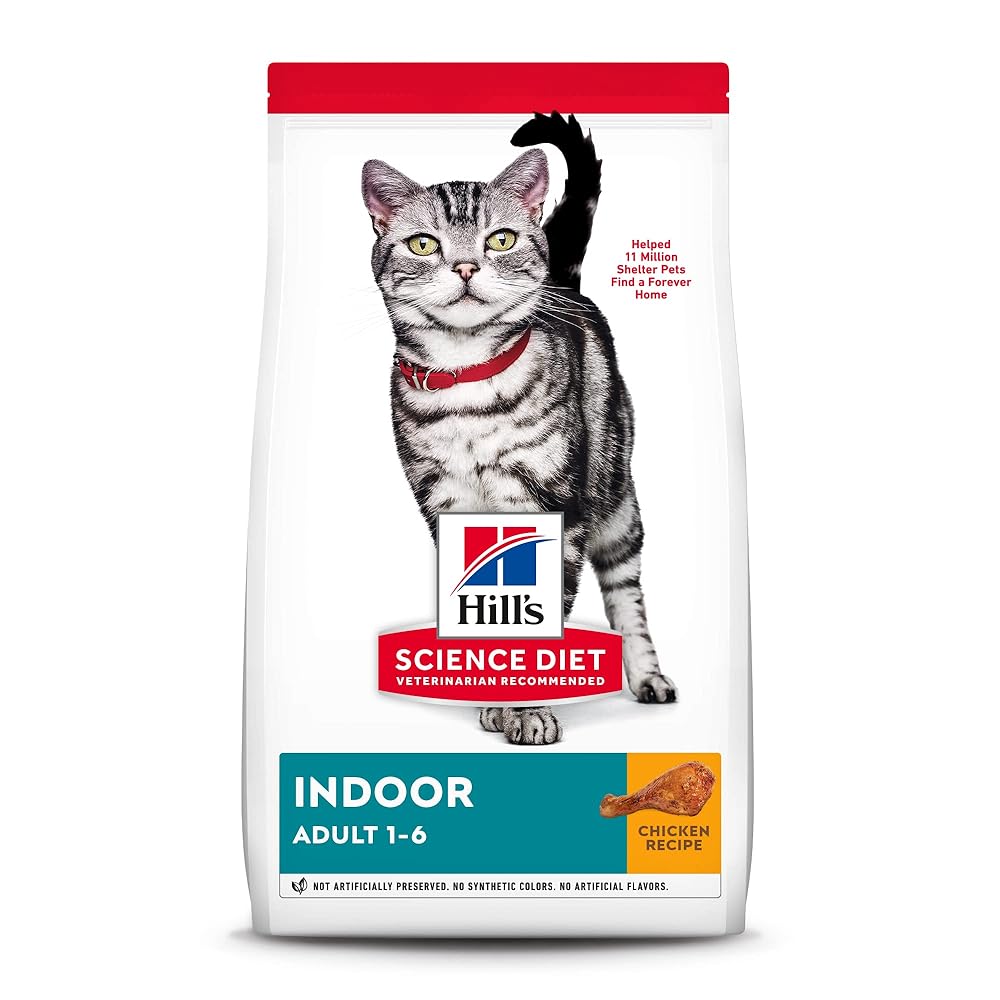iHeartCats is reader-supported. When you buy via links on our site, we may earn an affiliate commission at no extra cost to you.
The nutritional needs of indoor cats can be quite different from those of their outdoor counterparts. With a more sedentary lifestyle, indoor cats are more susceptible to issues like weight gain, which makes choosing the right food even more crucial. In this article, we will delve into the world of dry cat food specifically formulated for indoor cats, looking at key nutrients, ingredients, and the best options available on the market to help you make an informed decision for your feline friend.
#1 – CRAVE Grain Free Indoor Adult High Protein Natural Dry Cat Food with Protein from Chicken & Salmon, 10 lb. Bag
CRAVE Grain Free Indoor Adult High Protein Natural Dry Cat Food is a dry cat food that is formulated with real chicken and salmon as the main ingredients to provide cats with a protein-rich diet. It is made with all-natural, real ingredients inspired by cats’ natural, ancestral diet and does not contain any chicken by-product meal, corn, wheat, or soy protein. With 40% protein, this cat food supports muscle development, aids in digestion, and promotes a healthy immune system.
Best For: Cats who need a high-protein diet.
#2 – ACANA Indoor Entree Dry Cat Food, Free Run Chicken and Turkey Recipe, 4 lb
ACANA Indoor Entree Dry Cat Food is a grain-free dry cat food made with free-run chicken, turkey, and whole herring. It is specially formulated to meet the needs of indoor cats, with a blend of protein, fiber, probiotics, and nutrients to support digestive health, weight management, and hairball control. Made in the USA with high-quality ingredients, ACANA Indoor Entree is a nutritious option for cat owners.
Best For: Indoor cats with specific dietary needs. (best for indoor cats)
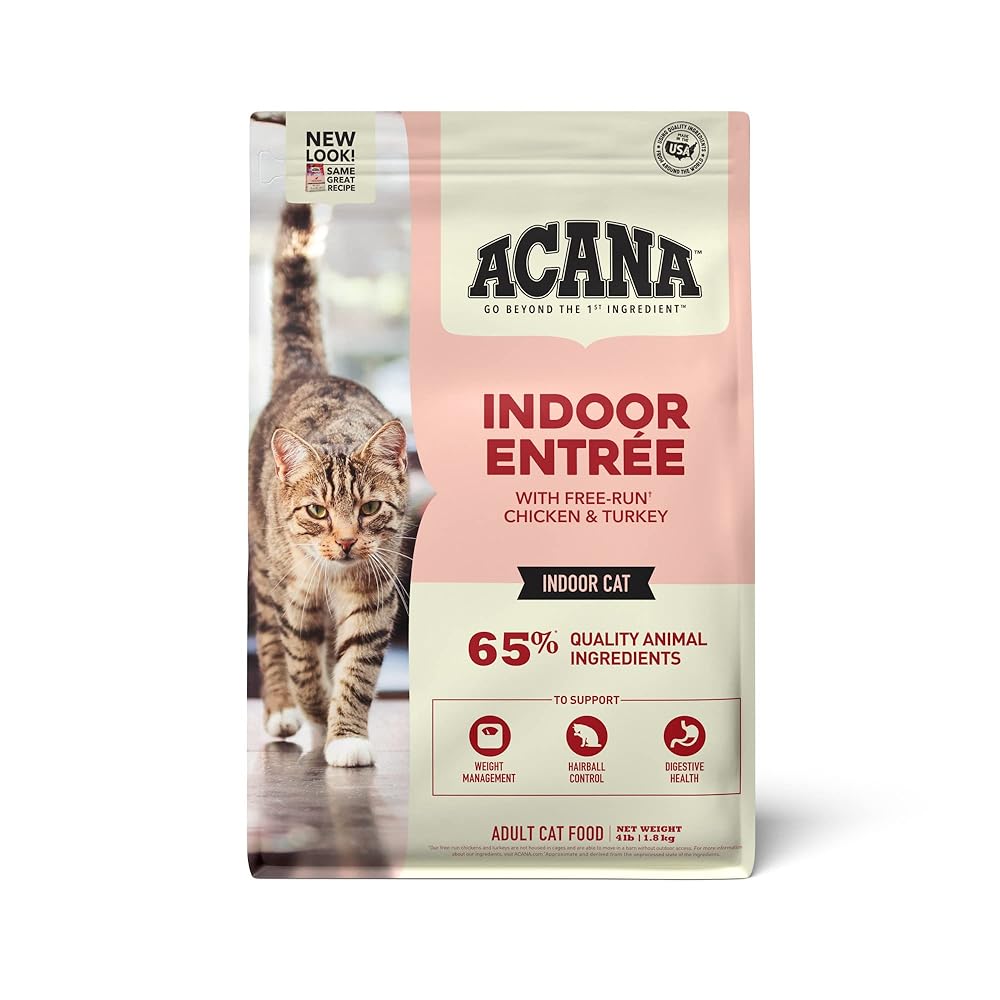
#3 – NUTRO WHOLESOME ESSENTIALS Adult Indoor Natural Dry Cat Food for Healthy Weight Farm-Raised Chicken & Brown Rice Recipe, 3 lb. Bag
Nutro Wholesome Essentials Adult Indoor Natural Dry Cat Food is a nutritious cat food made with real chicken and brown rice. It is designed to support healthy weight management and digestion in indoor cats. The formula does not contain any artificial preservatives, flavors, or colors and is made with non-GMO ingredients sourced from trusted farmers and suppliers.
Best For: Healthy weight management and digestion in indoor cats.
#4 – Blue Buffalo Wilderness High Protein, Natural Adult Indoor Dry Cat Food, Chicken 11-lb
Blue Buffalo Wilderness High Protein, Natural Adult Indoor Dry Cat Food is a grain-free cat food specially formulated for indoor cats. It is packed with real chicken to support lean muscle mass and contains BLUE’s exclusive LifeSource Bits to support immune system health. This natural cat food is made with high-quality ingredients and does not contain any chicken by-product meals, corn, wheat, soy, artificial flavors, or preservatives.
Best For: Indoor cats with dietary restrictions
#5 – Blue Buffalo Tasteful Indoor Natural Adult Dry Cat Food, Chicken 7lb bag
The Blue Buffalo Tasteful Indoor Natural Adult Dry Cat Food is a nutritious and flavorful option for indoor cats. Made with real chicken as the first ingredient, this formula is designed to promote kidney and bladder health, as well as support a healthy skin and coat. It includes BLUE’s exclusive LifeSource Bits, which are a blend of antioxidants, vitamins, and minerals to boost immune system health.
#6 – Rachael Ray Nutrish Indoor Complete Premium Natural Dry Cat Food, Chicken with Lentils & Salmon Recipe, 14 Pounds (Packaging May Vary)
The Rachael Ray Nutrish Indoor Complete Premium Natural Dry Cat Food is a high-quality cat food option that is specifically formulated for indoor cats. It features small kibble that is easy for cats to chew and swallow, as well as a blend of real salmon, lentils, and superfoods to support the dietary needs of indoor cats. This cat food also includes natural prebiotics, vitamins, minerals, and amino acids to promote a healthy digestive tract and overall well-being in adult cats. It does not contain any fillers, artificial flavors, or preservatives, making it a wholesome and nutritionally balanced option for cats.
Best For: Best on a budget
#7 – Purina Cat Chow Indoor Dry Cat Food, Hairball + Healthy Weight – (4) 3.15 lb. Bags
Purina Cat Chow Indoor Dry Cat Food, Hairball + Healthy Weight is a brand of dry cat food specially made for indoor cats. It is formulated with real farm-raised chicken and contains a natural fiber blend that helps control hairballs and promote healthy digestion. This product also helps with maintaining a healthy weight for indoor cats with decreased activity levels. It is made with high-quality ingredients and does not contain any artificial flavors.
Best For: Indoor cats with hairball issues and weight management.
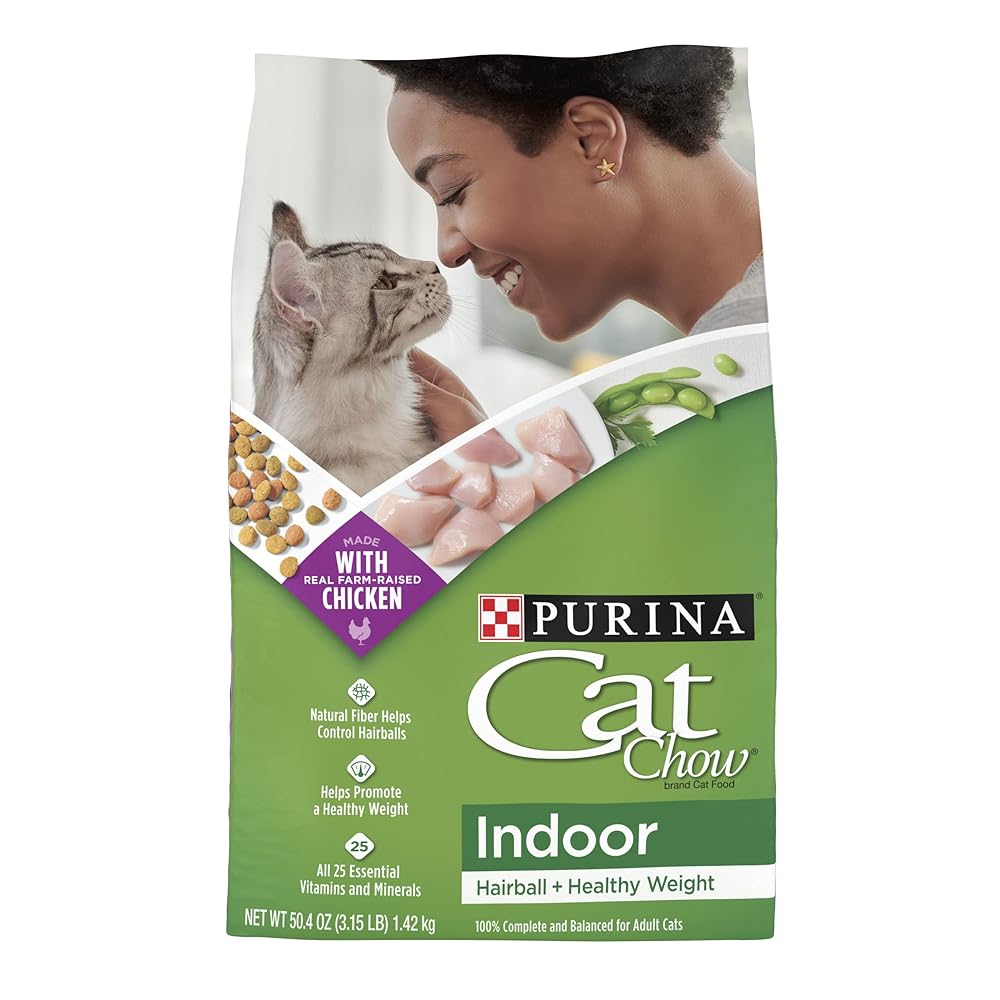
#8 – Purina ONE Natural, Low Fat, Weight Control, Indoor Dry Cat Food, +Plus Indoor Advantage – 3.5 lb. Bag
This product is a 3.5 lb bag of Purina ONE Natural, Low Fat, Weight Control, Indoor Dry Cat Food, +Plus Indoor Advantage. The number 1 ingredient is real turkey, and it is designed to provide the protein cats need for strong muscles. It has 10% less fat than other Purina cat foods and contains fiber-rich nutrition to help minimize hairballs and support a strong immune system. It also does not contain artificial flavors or preservatives.
Best For: Cats in need of weight control and indoor nutrition.
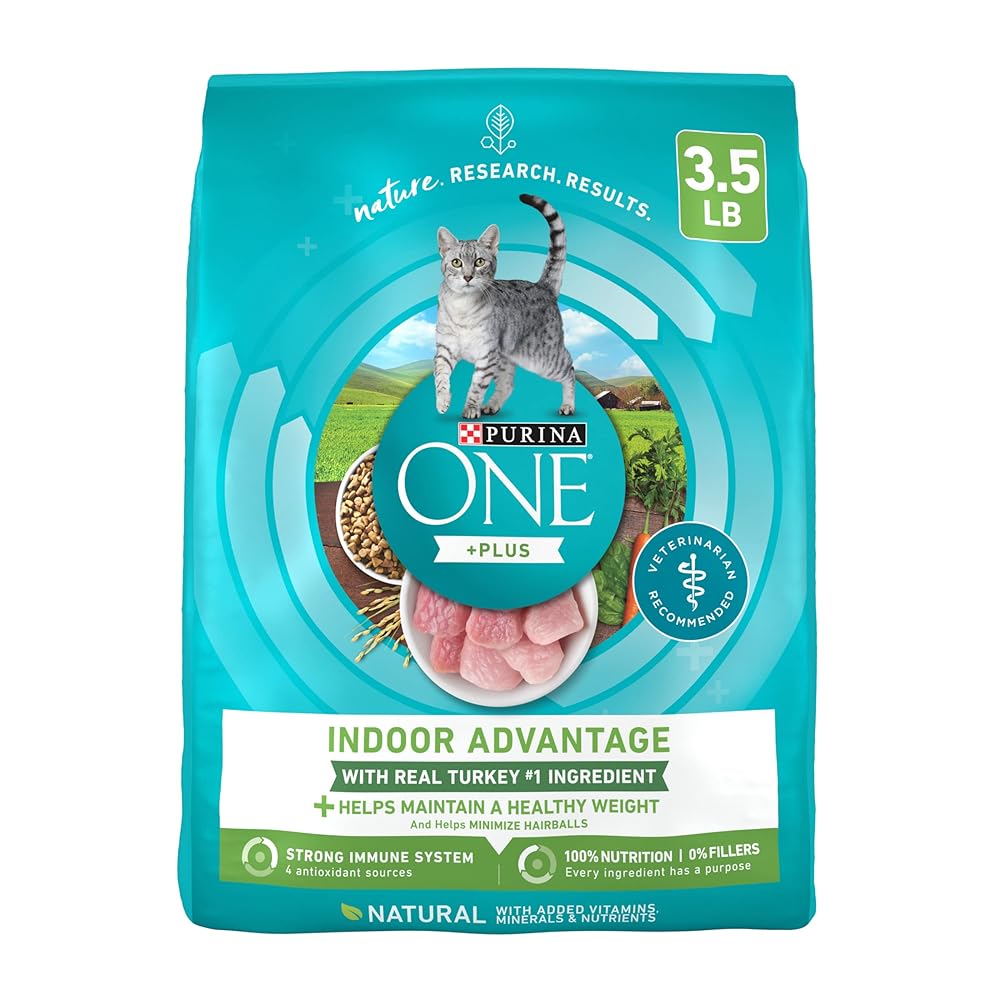
#9 – Hill’s Science Diet Adult Indoor Cat Food, Chicken Recipe Dry Cat Food, 7 lb. Bag
Hill’s Science Diet Adult Indoor Cat Food is a dry cat food formulated to meet the specific needs of adult cats living an indoor lifestyle. It is made with natural fibers to support healthy digestion and easy litter box cleanup. This cat food also includes quality protein and natural fibers to help satisfy your cat’s hunger between meals.
What Nutritional Needs Do Indoor Cats Have?
Indoor cats have specific nutritional needs that differ somewhat from cats that roam outdoors. Here are some key points to consider:
- Caloric Intake: Indoor cats are generally less active than outdoor cats and therefore require fewer calories to maintain a healthy weight. Overfeeding can quickly lead to obesity, which comes with a host of health problems.
- Protein: High-quality animal protein is essential for all cats, but it’s especially important for indoor cats to maintain muscle mass. Look for foods where a source of animal protein is listed as the first ingredient.
- Fiber: Indoor cats are more prone to issues like hairballs and constipation, so a certain amount of fiber in their diet can be beneficial. Fiber helps move hair through the digestive system and adds bulk to stool.
- Fats: While fats are necessary for energy and absorption of fat-soluble vitamins, the quantity should be moderated for indoor cats due to their lower activity levels. Omega-3 and Omega-6 fatty acids are beneficial for skin and coat health.
- Vitamins and Minerals: Essential nutrients like taurine, calcium, and various vitamins should be included in any cat food. However, consult your vet to see if your indoor cat needs any specific supplements.
- Hydration: While dry food is convenient, indoor cats often don’t get as much natural hydration (from prey) as outdoor cats. Make sure fresh water is always available, and consider incorporating wet food into their diet for additional moisture.
- Special Nutrients: Ingredients like glucosamine and chondroitin can be beneficial for indoor cats as they age, helping to maintain joint health and mobility.
- Low Carbohydrate: Cats are obligate carnivores and do not require a high level of carbohydrates. Some high-carb foods can contribute to weight gain and other health issues in indoor cats.
Always consult your veterinarian for personalized advice, especially if your indoor cat has special medical needs or is aging. With the right balance of nutrients, you can help your indoor cat lead a long, healthy, and happy life.
What Should I Look for When Choosing an Dry Cat Food for an Indoor Cat?
When choosing a dry cat food for an indoor cat, you’ll want to consider several factors to ensure you meet their specific nutritional needs.
- High-Quality Protein Source: Look for a cat food where a high-quality animal protein is listed as the first ingredient. Cats are obligate carnivores, meaning they require a diet high in meat-based protein.
- Caloric Content: Indoor cats are generally less active than their outdoor counterparts, so you’ll need to pay close attention to the caloric content of the food to avoid weight gain. Many brands offer “indoor formulas” designed with lower calorie counts.
- Fiber Content: Because indoor cats are more prone to hairballs and may have less regular bowel movements, a moderate amount of fiber can be beneficial. Ingredients like beet pulp, rice bran, or certain types of grains can provide the necessary fiber.
- Fat and Omega Fatty Acids: While fat is an essential nutrient, indoor cats don’t require as much of it due to their lower activity levels. Look for food that contains omega-3 and omega-6 fatty acids for skin and coat health but in moderated amounts to prevent unnecessary weight gain.
- Vitamins and Minerals: Ensure that the cat food you choose is well-balanced and contains essential vitamins and minerals like taurine, calcium, and vitamin E. Some foods are fortified with additional nutrients beneficial for indoor cats.
- No Harmful Additives: Avoid foods that contain artificial preservatives, colors, or flavors, as these can be harmful or allergenic to some cats.
- Special Needs: If your indoor cat has specific health issues like urinary tract problems, allergies, or is a senior, look for a dry food formula that addresses these concerns. Always consult your vet when making dietary changes, especially for cats with health issues.
- Taste and Palatability: It won’t matter how nutritious a food is if your cat refuses to eat it. Opt for a brand that has high customer reviews for palatability or offers a satisfaction guarantee.
- Price and Availability: While you shouldn’t compromise on quality, it’s also important to find a cat food that fits within your budget and is readily available for purchase.
- Veterinarian-Approved: Always consult with your veterinarian for personalized advice tailored to your indoor cat’s specific health needs, age, and activity level.
By considering these factors and consulting with your veterinarian, you can make an informed decision when choosing the best dry cat food for your indoor cat.
Frequently Asked Questions About Dry Foods for Indoor Cats
1. What are the main differences between dry food for indoor cats and regular dry cat food?
Dry food formulated specifically for indoor cats usually has fewer calories and may contain additional fiber to aid digestion and prevent hairballs. These formulas often include specialized nutrients designed to support the less active lifestyle of indoor cats.
2. How much dry food should I feed my indoor cat?
The amount of dry food your indoor cat needs can vary based on age, weight, and activity level. Always follow the feeding guidelines provided on the packaging and consult your veterinarian for personalized advice, especially if your cat is overweight or has specific health issues.
3. Do indoor cat formulas have fewer proteins?
Not necessarily. High-quality indoor cat foods should still list a quality source of animal protein as the first ingredient. However, these formulas may have fewer calories from fats to account for reduced activity levels.
4. Can I mix wet and dry food for my indoor cat?
Yes, many cat owners choose to mix wet and dry food to provide a balanced diet. Wet food can provide extra hydration and variety. However, be sure to adjust the caloric intake appropriately to prevent weight gain.
5. What types of fiber are beneficial for indoor cats?
Ingredients like beet pulp, rice bran, and certain grains or vegetables can provide the necessary fiber to aid in digestion and help control hairballs. Look for foods that contain these types of fiber in moderate amounts.
6. Are grain-free foods better for indoor cats?
The grain-free trend is popular, but it’s not necessarily better for all indoor cats. While some cats have grain sensitivities, many do not. Consult your veterinarian to determine if a grain-free diet is appropriate for your cat.
7. What should I do if my indoor cat gains weight on dry food?
Weight gain can be a concern for indoor cats. If you notice your cat is gaining weight, consult your veterinarian for advice, which may include changing to a weight-management formula or adjusting portion sizes.
8. How can I transition my indoor cat to a new dry food?
Transition to a new food gradually over a week, mixing increasing amounts of the new food with the old to avoid upsetting your cat’s stomach. Monitor for signs of digestive upset and consult your veterinarian if issues persist.
9. Is dry food sufficient for an indoor cat’s hydration needs?
No, dry food does not provide enough hydration on its own. Always ensure that fresh water is readily available, and consider incorporating wet food into your cat’s diet for extra hydration.
10. Do indoor cat foods come in different flavors?
Yes, just like regular cat foods, indoor formulas are available in a variety of flavors, such as chicken, salmon, or turkey. This allows you to offer some variety while still meeting your cat’s specific nutritional needs.
Conclusion: Best Dry Cat Foods for Indoor Cats
Navigating the world of dry cat food can be a daunting task, especially when you’re aiming to meet the specific needs of your indoor cat. From keeping an eye on caloric intake to ensuring that the food is rich in essential nutrients like protein and fiber, there are various factors to consider. However, armed with the information from this article, you should feel more confident in making a choice that supports your indoor cat’s overall health and well-being. Remember, while dry food is convenient and essential, it should be part of a balanced diet that includes hydration and regular veterinary check-ups to keep your feline friend happy and healthy.

